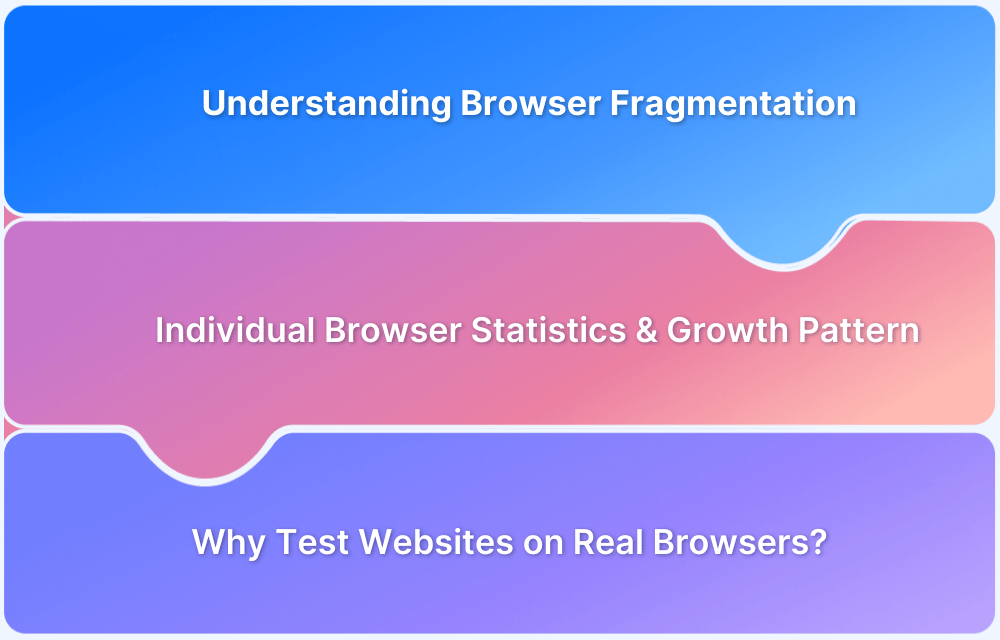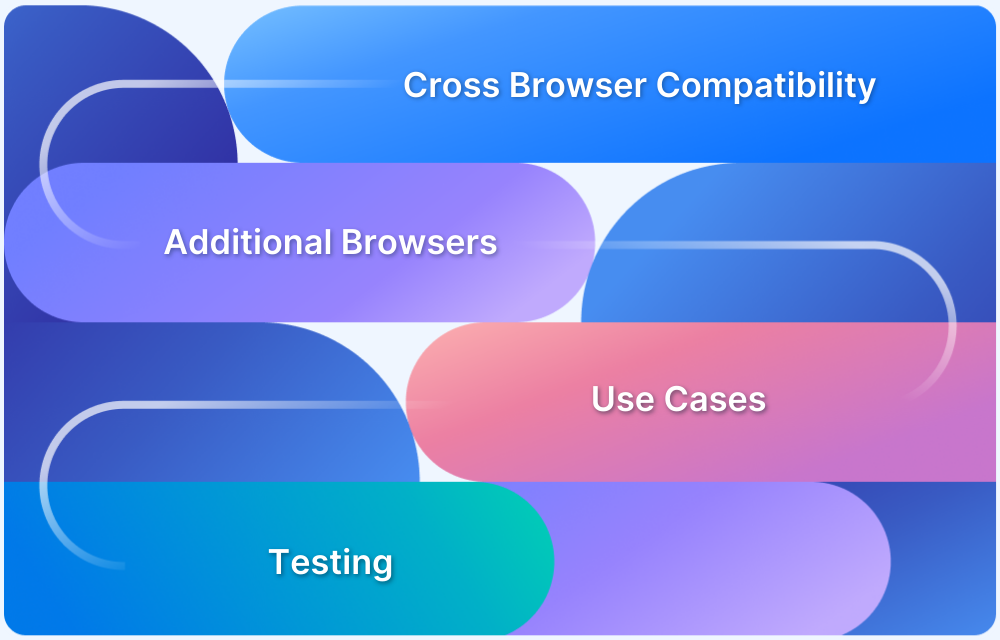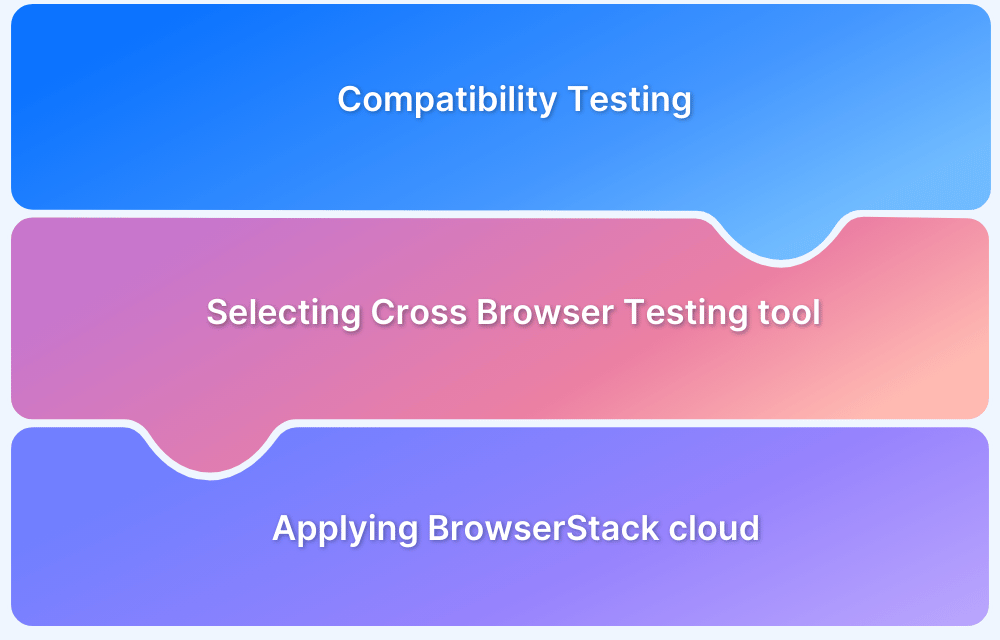With over 70% of mobile browsing happening on Android, selecting the best browser is crucial for delivering a smooth, reliable user experience. However, the task of choosing the best browser for Android testing can be overwhelming given the number of choices available.
Overview
Top 10 Best Browsers for Android in 2025
- Google Chrome – Fast, resource-intensive, powerful developer tools.
- Mozilla Firefox – Privacy-focused, cross-platform sync, customizable.
- Microsoft Edge – Windows integration, built-in tools, security features.
- Opera – Ad blocker, free VPN, battery saver mode.
- Brave – Advanced tracker blocking, Tor integration, efficient battery use.
- Samsung Internet – Popular on Samsung devices, accessibility features, VR support.
- Dolphin – Gesture controls, Webzine, multiple search engines.
- DuckDuckGo – Private browsing by default, cache & cookie clearing.
- Vivaldi – Advanced tab management, built-in productivity tools.
- Ecosia – Eco-friendly, funds tree planting with searches.
This guide explains 10 best Android browsers, covering performance, privacy, features, and why real-device testing is key to delivering flawless user experiences.
Importance of Cross Browser Compatibility
In today’s digital landscape, ensuring cross browser compatibility is crucial for any website aiming to provide a seamless and inclusive user experience. Here’s why cross browser compatibility should be a top priority for web developers and businesses alike:
- Better SEO Performance: Websites optimized for different browsers are preferred by search engines, which can lead to higher search rankings.
- Enhanced User Experience: Provides a consistent and seamless experience for all users, regardless of their browser choice, boosting overall satisfaction.
- Expanded Audience Reach: Broadens the potential audience by making the website accessible on various browsers, including less common and older versions.
- Greater Accessibility: Accommodates a diverse range of user needs and preferences, including those who rely on specific browsers for accessibility features.
- Adherence to Standards: Ensures compliance with web standards and best practices, reducing the risk of functionality issues and promoting long-term sustainability.
- Cost-Effective Maintenance: Addresses compatibility issues early, minimizing the need for extensive fixes and updates in the future.
Run Cross Browser Tests on Real Devices
Factors to consider when Choosing among Best Browsers for Android
Here are the key factors that you should consider when choosing the Best Browser for Android:
- Performance: Look for browsers that offer fast page loading times, smooth scrolling, and efficient use of system resources to ensure a smooth browsing experience.
- Security: Prioritize browsers that provide strong security features such as built-in ad blockers, anti-tracking tools, HTTPS support, and regular security updates to protect your data and privacy.
- User Interface: Choose a browser with a user-friendly interface, customizable settings, and intuitive navigation to enhance your browsing convenience and productivity.
- Features: Consider browsers that offer useful features like tab management, offline reading mode, download manager, dark mode, and password manager for added functionality.
- Compatibility: Ensure compatibility with your Android device’s specifications, including RAM and processor requirements, to avoid performance issues and compatibility conflicts.
- Updates and Support: Select browsers that receive regular updates and provide reliable customer support to address any issues or concerns promptly.
To make an informed decision and optimize your browser choice for performance, expert guidance can be valuable.
Get Expert QA Guidance Today
Schedule a call with BrowserStack QA specialists to discuss your testing challenges, automation strategies, and tool integrations. Gain actionable insights tailored to your projects and ensure faster, more reliable software delivery.
10 Best Browsers for Android in 2025
Here are seven of the best browsers for Android in 2025, offering a range of features from speed and privacy to seamless integration and customization options. Whether you prioritize fast performance, robust privacy protections, or intuitive user interfaces, these browsers cater to various browsing preferences:
1 . Google Chrome

The majority of Android users have Google Chrome pre-installed on our Android devices, and we choose to continue using it. This is because one of the most reputable technology companies (Google) developed it and laboured to make it robust and user-friendly.
Other than that, it has the following benefits that make it an excellent web browser.
Advantages
- Speed and Performance: Chrome is known for its fast page loading times, efficient use of system resources, and smooth browsing experience even with multiple tabs open.
- Developer Tools: Chrome provides powerful developer tools for web development and debugging, making it a favorite among developers for testing and optimizing websites.
- Security Features: Chrome includes built-in security features such as Safe Browsing, sandboxing, and automatic updates to protect users from malware, phishing, and other online threats.
Limitations
- Resource Consumption: Chrome is known to consume significant system resources, especially RAM, which can lead to slower performance on devices with limited resources.
- Privacy Concerns: Some users may have privacy concerns due to Google’s data collection practices, as Chrome collects browsing data to personalize user experiences and improve services.
- Battery Drain: Chrome’s resource-intensive nature can lead to faster battery drain on mobile devices, impacting battery life.
2. Firefox

Firefox is the other browser that frequently competes with Google Chrome in terms of functionality and features.
Advantages
- Privacy Focus: Firefox prioritizes user privacy with features like Enhanced Tracking Protection and a Private Browsing mode that doesn’t save browsing history, ensuring a more confidential online experience.
- Cross-Platform Compatibility: Firefox is available on multiple platforms, including Windows, macOS, Linux, iOS, and Android, offering a consistent browsing experience across devices.
- Performance: Firefox delivers fast page loading times, smooth browsing performance, and efficient use of system resources, making it a reliable and responsive browser for daily use.
Limitations
- Extension Compatibility: While Firefox offers a wide range of extensions, some may not be as compatible or as regularly updated compared to those available for other browsers like Chrome.
- Mobile App Performance: The Firefox mobile app may not always deliver the same level of performance and responsiveness as its desktop counterpart, leading to potential usability issues on mobile devices.
- Integration with Google Services: Firefox’s integration with Google services may not be as seamless as with Chrome, which could be a drawback for users heavily reliant on Google’s ecosystem for productivity and convenience.
3. Microsoft Edge

Microsoft Edge is a web browser developed by Microsoft and published for the first time in 2015. It is the default browser for Windows 10 and is also available for Android and other platforms.
Advantages
- Seamless Integration with Windows: Edge integrates deeply with Windows, offering features like Cortana assistance, Windows Timeline, and smooth compatibility with other Microsoft services and applications.
- Privacy and Security Features: Edge includes advanced privacy settings, tracking prevention, and InPrivate browsing mode, enhancing user privacy and security.
- Built-In Tools and Features: Edge offers a variety of built-in tools such as a PDF reader with annotation capabilities, a reading mode for distraction-free reading, and a collection feature for organizing and saving web content easily.
Limitations
- Microsoft Account Dependency: Some features of Edge, such as syncing across devices, require a Microsoft account, which might not be ideal for all users.
- Legacy Compatibility Issues: While Edge includes IE mode for compatibility with older websites and applications, this feature can sometimes lead to performance issues when switching between modern and legacy modes.
- Slow Adoption of New Web Technologies: Although Edge is based on the Chromium engine, there can be a delay in adopting the latest web technologies and features compared to other browsers.
4. Opera

Opera is a decent option if you want a browser that is both feature-rich and reasonably quick. As a general-purpose web browser, Opera has nearly everything.
Advantages
- Built-in Ad Blocker: Opera has a built-in ad blocker that enhances page loading speeds and provides a cleaner browsing experience without needing third-party extensions.
- Free VPN Service: Opera offers a free, unlimited VPN that helps users browse privately and access geo-restricted content without additional software.
- Battery Saver Mode: Opera includes a battery saver mode designed to extend laptop battery life by reducing background activity and optimizing resource usage.
Limitations
- Limited Extension Ecosystem: Although Opera supports extensions, its extension ecosystem is smaller compared to Chrome or Firefox, limiting the customization options for users.
- Less Popularity: Opera’s market share is relatively small, which can result in less priority from developers when ensuring website compatibility and optimization.
- Privacy Concerns with VPN: While Opera offers a free VPN, it is a proxy service rather than a full-fledged VPN, and its privacy policy regarding data collection may raise concerns for privacy-focused users.
Pro Tip : Millions of QA testers and developers use Browserstack Live to gain immediate access to over 3000 authentic browsers and devices and to create exceptional user experiences. Learn more about Cross Browser Compatibility Testing beyond Chrome by reading the article on the subject.
5. Brave
![]()
The Brave web browser is the most secure browser for Android devices.
Advantages
- Security Features: Brave includes advanced security features such as HTTPS Everywhere, which ensures secure connections, and fingerprinting protection, which prevents websites from tracking users based on their device’s unique fingerprint.
- Integrated Tor Browser: Brave offers a private browsing mode with Tor, enhancing anonymity by routing traffic through the Tor network and providing an extra layer of privacy and security.
- Battery Efficiency: By blocking resource-heavy ads and trackers, Brave helps conserve battery life on mobile devices, making it an ideal choice for users on the go.
Limitations
- Compatibility Issues: Some websites may not function properly or display content correctly because Brave blocks certain ads and trackers that the sites rely on for functionality.
- Learning Curve: Users may need time to adjust to Brave’s unique features, such as the built-in rewards system and privacy settings, which can be more complex than traditional browsers.
- Occasional Website Breakages: Brave’s aggressive ad and tracker blocking can sometimes break website functionality, requiring users to manually adjust shields or whitelist certain sites.
6. Samsung Internet Browser

While perusing the web, Samsung Internet Browser safeguards your privacy and security. It delivers web content-blocking filters.
Samsung phones are one of the most popular android phones globally. This makes Samsung Internet Browser one of the popular browsers.
Advantages
- Ad Blocking: The browser has built-in ad-blocking capabilities, enhancing the user experience by reducing distractions and improving page loading times.
- Enhanced Accessibility: Samsung Internet Browser offers accessibility features like high contrast mode, font size adjustments, and reader mode, catering to a wider range of users.
- Virtual Reality (VR) Support: It supports VR content, allowing users to browse immersive web experiences with compatible VR headsets, which is a unique feature not found in many other browsers.
Limitations
- Compatibility Issues: Due to its focus on Samsung devices, there might be occasional compatibility issues with certain websites or web applications that are not optimized for this browser.
- Limited Extensions: Compared to some other popular browsers, Samsung Internet Browser has a more limited selection of extensions and add-ons, which may limit customization options for users.
- Market Share: Despite its popularity on Samsung devices, the browser may have a smaller market share compared to more widely used browsers like Google Chrome or Mozilla Firefox.
7. Dolphin

Dolphin is a popular Android browser that offers gaming-specific features such as:
Gesture controls – allowing users to control games with intuitive gestures.
Advantages
- Multiple Search Engines: Users can switch between different search engines directly within the browser, offering flexibility and convenience.
- Gesture Controls: Dolphin Browser offers gesture controls for various actions, allowing users to navigate the web more efficiently.
- Webzine Feature: The Webzine feature in Dolphin provides a magazine-style layout for browsing news and articles, offering a visually appealing experience.
Limitations
- Resource Intensive: Some users have reported that Dolphin can be resource-intensive, especially on older devices, leading to performance issues and battery drain.
- Privacy Concerns: Like many other browsers, Dolphin may raise privacy concerns due to data collection practices and the use of third-party services for features like search and syncing.
- Community Support: Compared to larger browser ecosystems, Dolphin’s community and support resources may be more limited, impacting troubleshooting and user assistance.
8. DuckDuck Go Private Browser

DuckDuckGo is ideal for private browsing, blocking tracking scripts by default for enhanced privacy. It clears cache and cookies upon tab closure but lacks desktop syncing.
Advantages
- Instant Answers: DuckDuckGo offers instant answers to search queries directly on the search results page, which can save time and provide quick access to information.
- Bangs Feature: DuckDuckGo’s “Bangs” feature allows users to search directly on other websites (like Wikipedia, Amazon, or YouTube) by typing a shortcut before their query, making searches more efficient.
- Minimalistic Design: Its clean and straightforward interface makes it easy to use, especially for users who prefer a simple browsing experience without unnecessary clutter.
Limitations
- Limited Platform Support: DuckDuckGo Browser may have limited support for certain platforms or devices compared to mainstream browsers, which are often available on a wider range of operating systems and devices.
- Smaller User Base: DuckDuckGo Browser has a smaller user base compared to major browsers like Chrome, Firefox, or Safari.
- Compatibility Issues: Some websites or web applications may not work optimally on DuckDuckGo Browser due to compatibility issues.
9. Vivaldi

Vivaldi, crafted by ex-Opera developers, stems from Chrome but boasts unique features and a user-friendly interface. It offers a Speed Dial akin to Opera and a top button for quick navigation to a webpage’s start.
Advantages
- Tab Management: It offers advanced tab management features like tab stacking, tab tiling, and a tab preview option, making it easier to organize and navigate multiple open tabs.
- Performance: It is known for its efficient performance, especially in handling heavy workloads and resource-intensive web applications, making it suitable for power users and developers.
- Built-in Tools: Vivaldi integrates various built-in tools such as a notes feature, screenshot tool, and a powerful bookmark manager, reducing the need for additional extensions or plugins.
Limitations
- Learning Curve: The high level of customization and advanced features in Vivaldi may result in a steeper learning curve for new users, especially those accustomed to more straightforward browsers.
- Mobile Experience: Vivaldi’s mobile browser is not as widely used or feature-rich as its desktop counterpart, which can be a downside for users who require seamless synchronization and functionality across devices.
- Extension Availability: While Vivaldi supports Chrome extensions, its extension library is not as extensive as Chrome’s, which might limit users who rely heavily on specific extensions for their workflow.
10. Ecosia

Ecosia stands out as one of the pioneering Android browsers focused on reducing the Digital Carbon Footprint. It operates using solar-powered servers, ensuring eco-friendly searches while also funding tree planting initiatives.
Advantages
- Environmental Impact: Ecosia is known for its commitment to environmental sustainability. Every search performed through Ecosia contributes to planting trees around the world,
- Transparency: Ecosia provides transparency reports detailing how they use revenue generated from searches to fund tree planting projects.
- User-Friendly Interface: Ecosia offers a user-friendly interface similar to other popular browsers, making it easy for users to switch without a steep learning curve.
Limitations
- Search Engine Quality: While Ecosia uses Bing as its search engine, some users may find its search results less comprehensive or relevant compared to other search engines like Google.
- Speed and Performance: Depending on the user’s location and network conditions, Ecosia’s browsing speed and performance may vary, impacting the overall user experience.
- Dependency on Revenue Model: Ecosia’s tree-planting initiatives depend on revenue generated from searches. Any fluctuations in search volume or revenue could affect their environmental impact goals.
Conclusion
Given the variance in how various web browsers implement open web standards, web developers must conduct cross-browser testing to ensure compatibility. It is the only method that offers a consistent user experience across browsers and devices.
While Browser Market Share is a major factor in choosing which browsers to test on in 2023, other factors including application-specific features, target audience, and geographical constraints must be taken into account to ensure comprehensive cross-browser testing.
Teams can initiate cross-browser compatibility testing manually with a real device cloud based solution such as BrowserStack Live or with automation tools such as Selenium, which is relied upon by the vast majority of businesses in the automation testing industry.
Depending on the market share, it is necessary to conduct testing on both older and more recent versions of various browsers. Perhaps most importantly, testing must be conducted on actual devices, taking into account actual user conditions, for more reliable test results.
Using a cloud-based testing infrastructure like BrowserStack to perform cross-browser testing is preferable to procuring and maintaining an actual digital lab of devices.






